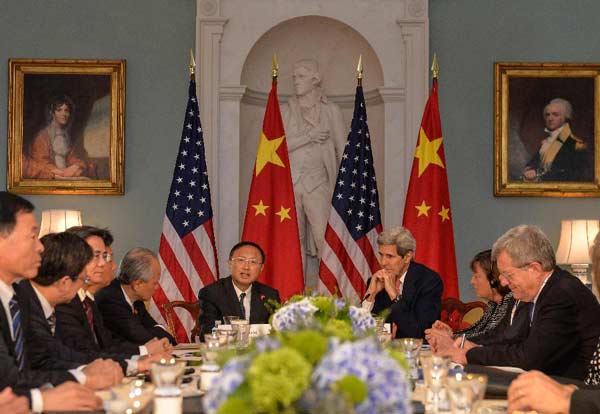 |
|
Chinese State Councilor Yang Jiechi (L, back) and US Secretary of State John Kerry (R, back) co-chair a special session on ocean protection under the framework of the seventh China-US Strategic and Economic Dialogue (S&ED) in Washington D.C., the United States, on June 24, 2015. [Photo/Xinhua] |
Both Beijing and Washington emerged from their latest dialogue more upbeat about their relations and committed to working together, which proves the world's most important bilateral relationship is far from beyond repair.
They argued, they quarreled, they even threatened to act against each other, over allegations of currency manipulation, cyberattacks, the South China Sea, and more. The rhetoric was harsh and there was talk about the two nearing a "tipping point" and the possibility of war.
But the just concluded China-US Strategic and Economic Dialogue reassuringly showed the Sino-US relationship, volatile as it has been, remains manageable, and the widely feared clash is not inescapable, as long as they share a political will to keep it at bay.
Prior to the dialogue, Johns Hopkins scholar David Lampton suggested "our respective fears are nearer to outweighing our hopes" than any time since the normalization of diplomatic ties, but the dialogue showed how different things can be when both sides resort to constructive engagement.
Many of the problems that trouble Sino-US relations, including the mutual distrust over each other's strategic intentions, have their roots in a persistent perception gap: The failure to see each other as they really are.
Blind optimism is dangerous, because it brews the illusion that deep and deepening economic interdependence will automatically steer the world's two largest economies away from outright confrontation. Yet so is the current pessimism over the recent trajectory of bilateral ties, which foresees the historical fatalism of the Thucydides trap.
The dialogue would not have been a success were it not for the diplomatic realism and pragmatism both parties displayed. It was the success of reason in this sense.
From the dialogue, we heard memorable lines that should forever guide the handling of the sometimes wayward Sino-US relations.
Chinese Vice-Premier Wang Yang said: "Decision-makers in both countries must always remember that confrontation is a negative sum game in which both sides will pay heavy prices, and the world will suffer, too."
John Kerry, US secretary of state, said: "No nations agree on every issue. But we do not accept that a narrowing of the differences is beyond our reach."
It was their agreeing to disagree, and their willingness to work together that have secured this essential turning-point in Sino-US relations at this critical moment.
As US Vice-President Joe Biden said: "There are important issues where we don't see eye-to-eye. But it doesn't mean we should stop working hand-in-hand."
And no hurdle cannot be overcome if the two countries continue to work hand-in-hand.